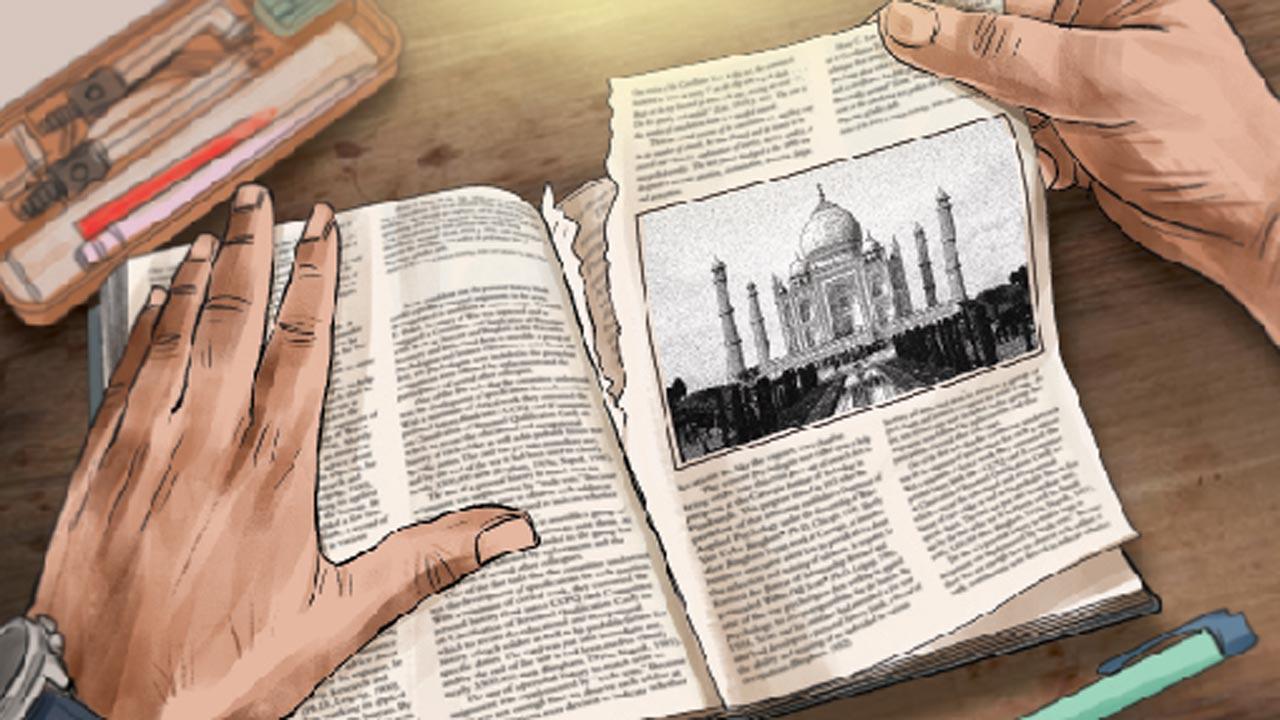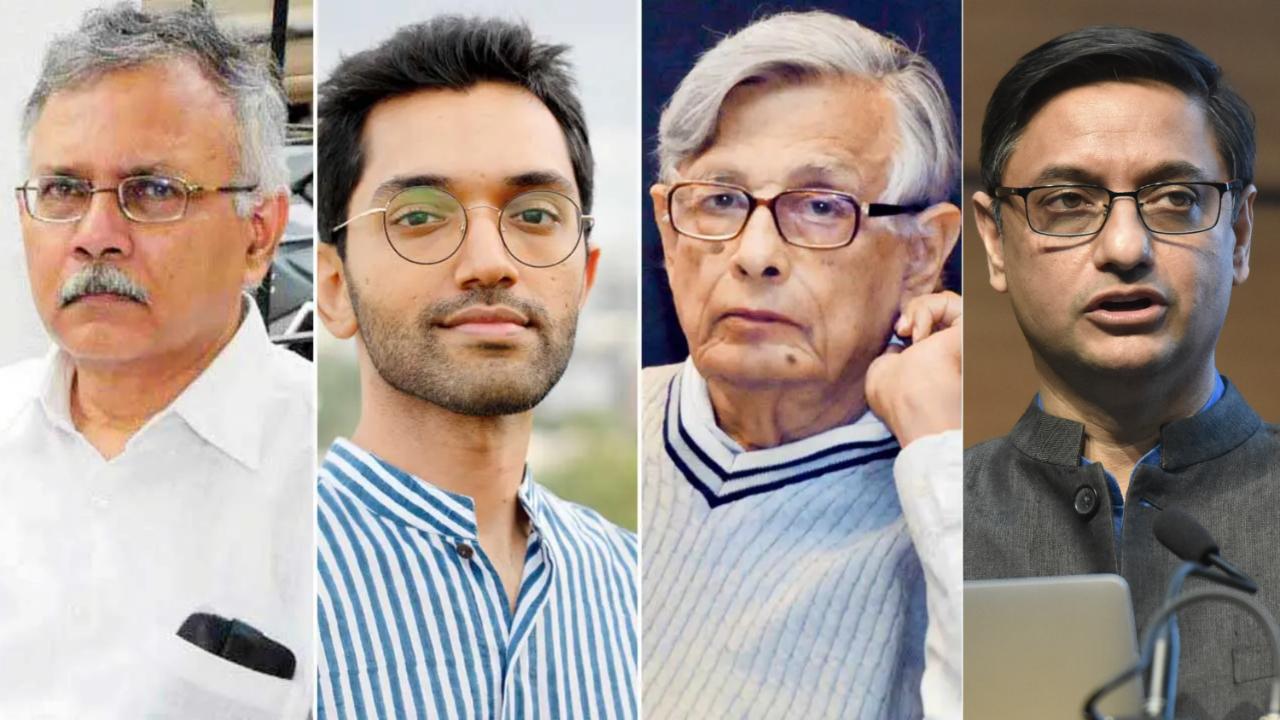Tearing out Muslim figures and whitewashing assassins from school textbooks will only create a generation of people who are intellectually emaciated, say historians while calling out NCERT’s fresh deletions

Illustration/Uday Mohite
The history lessons being taught in schools continue to be the subject of debate and discussion. Where last year the Karnataka government made news for “saffronising” textbooks, this week the National Council of Educational Research and Training (NCERT) was in the eye of the storm for dropping certain chapters from the Class XI and Class XII textbooks in Uttar Pradesh, as part of its “syllabus rationalisation” exercise.
ADVERTISEMENT
What has detractors criticising the NCERT’s decision is the fact that the deleted content is in some way or another in line with the ruling party’s current views, be it the Mughal rule in India, the assassination of Mahatma Gandhi or the history of the Rashtriya Swayamsevak Sangh (RSS).
One of the erased chapters was Kings and Chronicles: the Mughal Courts (C. 16th and 17th centuries) from the Class XII book, Themes of Indian History-Part II. The NCERT is reported to have stated that these chapters were “overlapping” and “irrelevant”. The question that begs to be answered is whether there has, until now, been excessive focus on the Mughals, at the cost of other historical periods. “Given that the Mughal period lasted for many centuries [1526 till 1800s], the focus on its legal history, judicial system and administration among other aspects isn’t surprising,” feels author and political commentator Raghavan Srinivasan, who has written books like Yugantar and Rajaraja Chola.
 Raghavan Srinivasan, Manu Pillai , Irfan Habib and Sanjeev Sanyal. Pics/Getty Images
Raghavan Srinivasan, Manu Pillai , Irfan Habib and Sanjeev Sanyal. Pics/Getty Images
A lot of the history we learn today is based on documented evidence, he says. For instance, we don’t know much about Odisha’s history because there is very little archaeological or inscriptional material available there. “So, one may feel that their region is being underrepresented.”
“As a south Indian,” Srinivasan adds, “I sometimes feel that our history is overshadowed by north Indian history, but the solution is that you dig up more facts and then enrich the part that is weak.” He cites the recent excavations at Keeladi, near Madurai, which has pushed the data of urbanisation as well as the Tamil-Brahmi script farther back by at least a century. “This means that we now have a better understanding of the history of the south going back to 600 BC and even before.”
Srinivasan’s sentiments are echoed by author Manu Pillai, who says that there is typically a north Indian bias in Indian history, and this is not limited to the Mughals. “For instance, we read little about the maritime economy, peninsular India and its trading networks etc., and rather too much about battles and empires in upper India. But if the Mughals tend to occupy a lot of space, it is also because they were around as a dynasty until 1858. The Cholas, on the contrary, fell in the 13th century, and Vijayanagara in the 17th. This also means that the kind of source material we have for some of these earlier empires is limited in comparison with the Mughals, for whom a richer archive is available.”
Besides, says Pillai, the British also posed as successors of the Mughals. “So even after the fall of the last emperor [Bahadur Shah Zafar], his dynasty continued to cast a shadow over the regime that followed,” says Pillai.
According to Pillai, while revisions in textbooks are usually made to included fresher perspectives, in NCERT’s case “it is reasonable to suppose that the changes are part of a political project to particularly play down the importance of Muslim figures in our political history and to expunge elements that are embarrassing to the party in power and its own self-image, narrative, and ideology”.
In a chapter on Mahatma Gandhi’s assassination in the Class XII textbook, his assassin Nathuram Godse is no longer referred to as a “Brahmin from Pune”.
Tushar Gandhi, author and great grandson of Mahatma Gandhi insists that these are not standalone incidents, but part of a larger game plan to maintain a weak and ill-informed foundation, and indoctrinate lies on the basis of that ignorance. “The removal of even one sentence from a history or political science textbook matters because you have to look at the cumulative effect of the larger campaign of lies that goes on, and the systematic discrediting of established history that they have indulged in by branding it as biased and not truthful. The descriptor ‘a Brahmin from Pune’ matters because the fact is that all the accused in the Gandhi murder trial were Brahmins from Pune. It is an undeniable historical fact.”
Historian Irfan Habib says that one needs to look at the politics around Godse, the celebration and respect given to him publicly with temples being created in his name. “When you teach children this sort of history, you are going to create a generation, which is intellectually emaciated.”
NCERT’s move is not without its supporters. Sai Deepak J, Supreme Court and Delhi HC lawyer, and author of India that is Bharat, says the “pixellation of Mughal history also means pixellation of their religiously motivated atrocities, including that of Akbar who is projected as some kind of secular syncretic icon”. He feels that “their [Mughals’] attitudes towards the native population and faith systems should have been presented fully to compensate for the Nehruvian Marxist distortion Bharatiya history has been subjected to.” Economist and historian Sanjeev Sanyal says that he has been arguing for years how “our history needs to be corrected for colonial, Marxist and Nehruvian biases accumulated since the 19th century”. “The current textbooks clearly need to be changed, but this should be done while keeping in mind primary evidence, geographical balance and a sense of discovery rather than preachiness,” he says.
In a 10-minute YouTube video on his channel The Jaipur Dialogue, retired IAS officer Sanjay Dixit says that the inclusion of Akbarnama and Badshahnama [official Mughal histories commissioned by Akbar and Shah Jahan respectively] in the syllabus is the result of the policies implemented by “political darbaris” after the Independence. “When the Nehru family came to power, they believed that the Indian junta wouldn’t accept them as they did nothing more than walk the footsteps of the British. All of their parameters of modernity were westernised, including the beliefs that Hindus are backward and Islamists are more evolved. As a result, they installed a Maulana [Abdul Kalam Azad] as the Education Minister,” Dixit says in the video, adding, “A despot always controls the textbook first.”
Pillai, however, shoots down this theory, saying that it is, again, based on the presumption that Muslims in India are somehow joined at the hip to the Mughals. “Muslims in Kerala had nothing to do with them; in fact, in the south in general, we have very little emotional investment in the Mughals. If the idea was to appease Muslims, why do the Deccan Sultanates [they ruled in Maharashtra, Karnataka, and Telangana-Andhra Pradesh] barely receive any mention? Importantly, these states were enemies of the Mughals, so we must get over this thinking that Muslim identity and political history is a monolith that can be reduced to Mughal history.”
Also Read: Dalit journalists reveal the discrimination they face on minority reporting
 Subscribe today by clicking the link and stay updated with the latest news!" Click here!
Subscribe today by clicking the link and stay updated with the latest news!" Click here!







